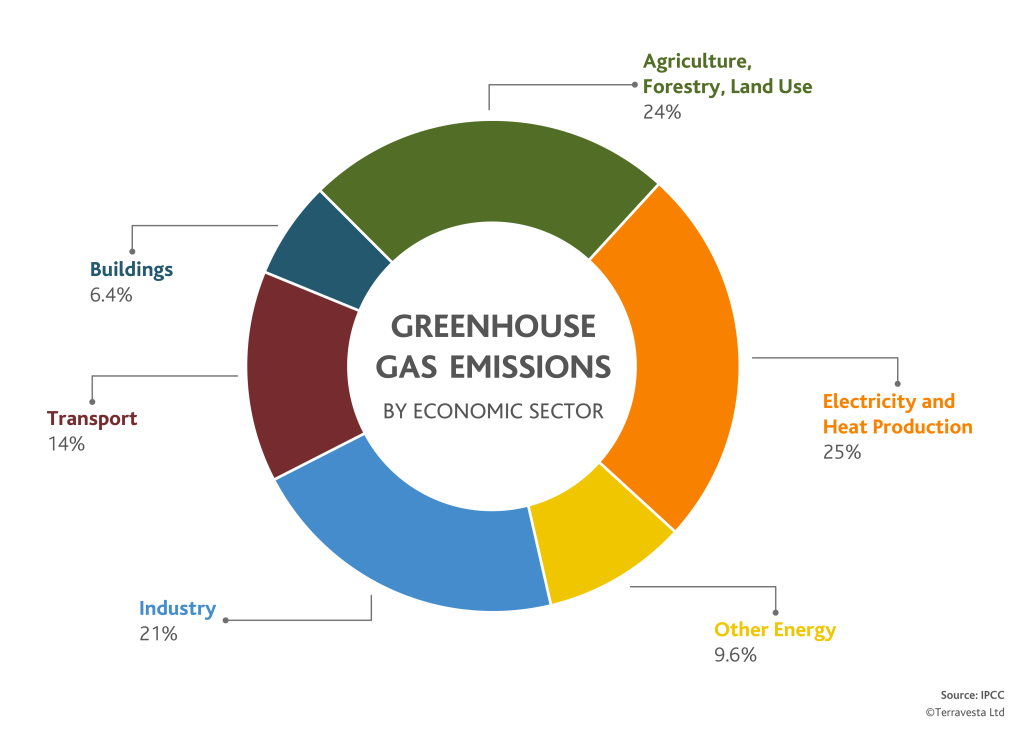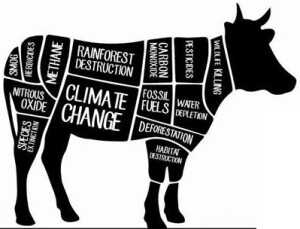Our Eating Habits Are Killing the Planet
Jun 19th, 2020 | By admin | Category: Food and Hunger/AgricultureBy Geoffrey Holland, guest writer for Transition Earth.
Humans have been a distinct species for at least 200,000 years. For most of those years, we were stone age nomads. Humans are omnivores, which mean we are able and willing to eat almost anything. During the Neolithic era, generally speaking, men hunted animals to eat, while women and children gathered berries and other wild plant edibles. Finding food was full time work. It was that way up until about 12,000 years ago, when humans began to cultivate plants and live in permanent settlements.That was the beginning of agriculture, which includes growing edibles like wheat and corn and also raising animals for their eggs, milk and meat. Agriculture didn’t have much of an impact on the planet, when it started, primarily because there were only about four million humans living on Earth.
Since then, agriculture has become a massively impactful human institution. Our ability to produce more than enough to feed ourselves has been a primary driver behind the steady growth of our population. From those modest Post-Neolithic beginnings, humans have become the most successful animal species on Earth. As of mid-year, 2020, humanity has grown to nearly eight billion in number, with about 75 million more of us being added to the population very single year. Each human we add to our numbers requires food, water, shelter, and personal security.
In the world’s developed nations, the way we eat has also evolved to provide abundant food at low cost. Up until about a hundred years ago, most of us were still involved in producing our own food. These days, in the U.S., we have ceded the production of our food to giant corporations. Big business has made it very easy to feast all day, every day on an incredible variety of affordable foods.
We tend to reduce the animal protein we eat down to commodities like eggs, beef steak, pork cutlets, chicken nuggets, etc. The living beings these foods came from are out of sight and out of mind for most people.
Take a moment to think about what it takes to produce cheap food for literally billions of humans. Eggs in cartons for $3/dozen in a supermarket start out in industrial scale facilities, where millions of commodified hens are cruelly confined, and pumped with hormones and antibiotics to keep them laying, day after day, until they are exhausted, at which time they are killed and reduced to feed for humans, pets, and other commodified animals.
Consider the milk and cheese we take for granted. To cheaply produce those food products, industrial diary operations keep nearly ten million cows pregnant so they will produce lots of milk. When calves are born, they are immediately removed from their mothers, whose genetics and gestation cycles are efficiently managed to keep them producing maximum milk yields, until they are exhausted, at which time they are sent to slaughter.
In the U.S. alone, something like 56 billion animals are slaughtered every year to provide humans with a vast variety of ribs, cutlets, fillets, and other cleverly packaged forms of animal protein. A recent study published by the National Academy of Sciences states that while humans constitute only 0.01% of the planet’s biomass, we have annihilated 83% of all wild animals and 50% of all plants. Of the birds remaining on Earth, 70% are poultry raised for human consumption. Of all the warm-blooded mammal biomass remaining on Earth, 60% of mammal biomass is animal flesh bred for slaughter, 36% is human biomass, with only 4% for all wild species. Let that sink in: 36% of all warm-blooded biomass on Earth is humans; 60% are animals we kill and eat; 4% for all wild species. That is a description of life out of balance.
We are also strip mining our seas to provide cheap fish for humans to consume around the world. Most of the commercial fisheries in our oceans are now either exhausted or are well on their way to that point. All large predator fish like tuna have been depleted by 90% in just the past 50 years.
If you count the farmed animals we raise and slaughter with the living creatures we take from our seas, the total number of animals killed and consumed by humans exceeds a trillion every year.
The scale and the efficiency with which we exploit other animal species and reduce them to supermarket commodities is mind-boggling. The cruelty and suffering that can be linked directly to each of us humans that eat animal protein is indefensible. We crave foods that please the palate. It’s been too easy to ignore the lives behind the foods we choose to eat.
________________
If a slaughterhouse had glass walls, everyone would be a vegetarian.
~Paul McCartney
________________
When we mindlessly consume milk, cheese, hamburgers, chicken nuggets, and every other kind of animal-based food commodity, we become complicit in the endless cycles of brutality motivated by our eating habits.
Our daily doses of animal protein also contribute directly to climate change. The billions of animals we slaughter produce huge quantities of methane during their growth cycles. Methane is 20 to 80 times more potent as a greenhouse gas than is the carbon dioxide we produce by the burning of oil and other fossil forms of energy.
We humans are on a relentless course. There are too many of us. There are no longer enough resources on our planet to sustain our needs. That is not hyperbole. This is not fake news. It’s a fact.
We must change our ways. As individuals, the most direct way we can contribute to positive change for our planet is to alter our eating habits. Just by reducing animal protein consumption by half, each of us can begin to be part of the solution. If such a lifestyle change were widely adopted, it would have an immediate impact on the health of our planet. The science says it would also be a boost for human health. Eating veggies also costs less; much less.
____________
The worst sin towards our fellow creatures is not to hate them, but to be indifferent to them: that is the essence of inhumanity.
~George Bernard Shaw, The Devil’s Disciple, 1897
____________
Humans are the apex species on our planet. We have an obligation to take care of the Earth we all depend on. A change in diet – less meat, cheese and eggs – translates directly to less anthropocentric greenhouse gas in our atmosphere. Eating less animal protein is the fastest and easiest step we can take toward our collective obligation as planetary citizens.
Backing away from a lifetime of eating habits is not easy. This is especially true when we are hammered 24/7 with media messaging that encourages indulgence when we eat. Declining to dine on animal flesh goes against the cultural inertia. You have to choose to nourish yourself entirely or primarily with foods made from plants. You have to choose to stop contributing to the suffering and death of commoditized animals. You have to embrace a diet that reflects compassion, and is also good for the health of our planet.
Every person needs to eat to survive. Here are a few basic commitments each of us can make to become part of the planetary scale shift in eating habits that is very much needed.
- Eat less or no animal protein – that means meat, eggs, dairy products
- Reduce consumption of heavily packaged, processed foods
- Avoid single use plastic utensils, straws, etc.
- Limit use of bottled water (In this case, the big problem is the single use plastic bottles)
For a more complete list of steps that lead to more environmentally friendly eating, check out this link: https://www.conserve-energy-future.com/35-easy-ways-to-eat-environmentally-friendly.php
___________________
Geoffrey Holland is an Emmy winning writer/producer. He is also the author of The Hydrogen Age and a regular contributor the Millennium Alliance for Humanity and the Biosphere.

![[photo: U.S. Department of Agriculture, Flickr/Creative Commons]](http://populationgrowth.org/wp-content/uploads/2020/06/chickens-300x167.jpg)


[…] June 22, 2020 In Big Ideas Food Security Lifestyle Perspective Science Uncategorized Our Eating Habits Are Killing the Planet […]